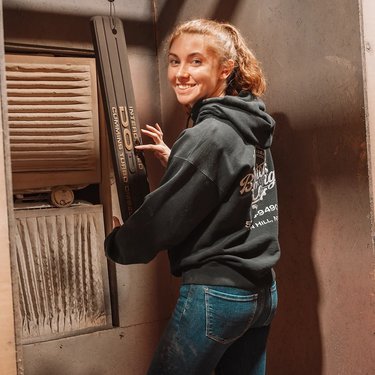Amid Westerlo drama, a young business-owner stands by
WESTERLO — With a $100 powder-coating gun, hand-me-down air compressor, and a toaster oven, Greenville resident Rebecca Haaland started Boosted Coatings in her apartment when she was just 19 years old.
Five years later, Haaland’s operation has grown to two locations: one in Norton Hill, and the other in Colonie. She planned this year to relocate the Colonie portion to Westerlo’s Shepard Farm, a former resort that was intended to become a local business hub in the rural community.
Unfortunately for Haaland, what should have been a fairly typical application process turned quickly into a political battle, fueled by pre-existing grievances between the major players, that culminated in the elimination of the town’s planning board and left her business in the lurch.
“It has now come down to the Town of Westerlo completely abolishing the planning board the Friday before my next meeting with the planning board, forcing me to start over with an entire new board which will push the process out another few months,” Haaland wrote on Facebook after the abolishment. “Shame on you Town of Westerlo Government News for trying to squash a small business.”
Through The Enterprise, Haaland was eager to clear up misconceptions about her business, which had found itself occupying a somehow both central and tangential place within the larger controversy in Westerlo.
According to Westerlo Supervisor Matt Kryzak, who spearheaded the effort to abolish the planning board, there were serious concerns about the way the planning board went about Haaland’s application, seemingly giving it too brief a look despite the insistence at the board’s May meeting from the town attorney, George McHugh, that the board get feedback from an engineer as well as fill out a long-form environmental review.
McHugh left that meeting in frustration after the board had agreed to have Haaland fill out the long-form review and make sure that the application checked out with the state’s Department of Environmental Conservation, but were ambivalent about getting an engineer involved.
The chairman at the time, Beau Loendorf, told Haaland that he would nevertheless coordinate with the engineer and figure out whether the board would involve him.
Haaland, who had spent about 15 minutes answering the board’s questions at that point, said in the meeting that she was “losing business by the day” so the extra time required was “severely hurting me.” Loendorf, who expressed sympathy for the delay, offered to get the long-form assessment filled out at the meeting.
It was soon after that McHugh walked out angrily, saying the board didn’t “need” him since it wasn’t taking his advice.
When it came time for the Albany County Planning Board to review Haaland’s application, in June, after the town planning board offered her a conditional approval, McHugh was there with Kryzak, town board member Lorraine Pecylak, and Kryzak’s confidential administrator and chair of the local Republican Party Lisa DeGroff, to successfully lobby against the application by raising concerns with both the application process and what some felt were environmental risks posed by the business.
Among other things, McHugh pointed out that the long-form assessment was only partially filled out, with the first 10 pages out of 13 almost completely blank. A copy of the application obtained by The Enterprise through Kryzak confirms this. However, a copy of the completed short-form obtained from Loendorf shows that several of the questions from the long-form had already been addressed in the short-form.
Kryzak, meanwhile, said that “there’s obviously an acid-bath portion to powder-coating that nobody talked about in this application,” which he said was partly why the proposal should be considered an industrial use. The county planning board cited the “industrial nature” of the proposal as part of its reasons for disapproving the project.
Haaland told The Enterprise this week that her products — a variety of metal items, but primarily automotive parts — are cleaned first through sandblasting, which is handled by a subcontractor offsite. She then wipes them down with carburetor cleaner, which contains acetone, a highly biodegradable and weak acid also found in nail-polish remover.
All the oils and chemicals applied to the metal are then burned off in the oven, Haaland said, a necessary step to prevent them from mixing with the powder and ruining the finish. She stressed that absolutely no chemical can come into contact with the coating gun, and that the powder is applied with compressed air.
One of the county planning board members went off of Kryzak’s speculation to speculate further that all the chemicals used in the process “drains to Greene County. It all runs downhill, right?”
Another member said his concerns came “right from the stomach.”
A woman whose back was to the camera recording the meeting appeared flustered by the question of how the powder would affect the air quality.
“They have to have fans to vent that out. Where’s that going to go?” she asked.
Haaland told The Enterprise she uses three large furnace filters and two fans to capture excess powder, which is then thrown out in a garbage can. None of it, she said, goes into the plumbing.
The United States Environmental Protection Agency notes that powder-coating is the preferred surface-coating method because of its low toxicity, and therefore low environmental impact.
Although the county’s senior planner, Gopika Muddappa, had expressed concern about the lack of detail in the application, the county planning board ultimately determined not that the proposal be fleshed out, but that it was “incompatible with the adjacent properties in the Rural Development/Agricultural zoning district,” and that there were concerns about its “impact on existing the land uses” and “community character,” in addition to recommending that the DEC and, because the property abuts a state highway, Department of Transportation get involved.
After this determination was released, the Westerlo planning board appeared to make an attempt to override the recommendation — which it’s legally allowed to do with a supermajority approval, in this case at least four votes in favor on a five-member board — which prompted Kryzak to speed up the abolishment of the board, as The Enterprise has previously detailed.
The functions of the planning board now rest with Westerlo’s five-member zoning board of appeals, meaning the zoning board will now be the one that determines Haaland’s application.
Kryzak told The Enterprise earlier this month that he believes “100 percent that this Boosted Coatings application can go through if we follow some of the recommendations — not all, but some — of the county planning board, and some of the recommendations by the town attorney and engineer.”
Kryzak said his primary concern is maintaining a “legally defensible” position for the town in all its decision-making to avoid unnecessary lawsuits.
Kryzak has pointed out that planning boards are not supposed to offer conditional approvals, per the Department of State. And, because Loendorf had resigned and tried to reinstate himself just prior to the meeting where the board might have given final approval to the application, possibly in violation of state law, there would have been serious questions about the legitimacy of that vote.
“If challenged, it will be an issue for the town and an issue for the applicant,” Kryzak said. “So you are not gaining anything by not following the law and not doing the due diligence.”
Still, the delay will have a tangible impact on Haaland’s business, which is, ironically, one of the things that Kryzak had initially said that abolishing the planning board would help business-owners avoid.
“Dealing with the push back from the town and then being caught in the middle of them abolishing the planning board has put a huge damper on my small business,” Haaland told The Enterprise in an email this week. “They say they wanted The Shepard Farm brought back to life and here is an up and coming, women owned business waiting to go in, but they don’t seem to want to make the process go smoothly.”



